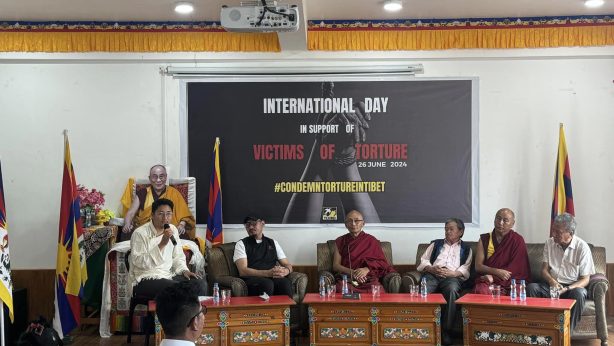Release Tibetan monks from arbitrary detention: Sentencing is politically motivated
Earlier this month, Chinese authorities sent two monks, Gendun Dakpa and Lobsang Sherab, to prison for allegedly ‘sharing information with outsiders’ and ‘inciting separatism’ in Ngaba (Ch: Aba) Tibetan and Qiang Autonomous Prefecture, Sichuan Province, in Tibet’s Amdo Province.
The monks were sentenced after almost a year of incommunicado detention since August last year.
On 17 June, the Trochu County People’s Court sentenced Gendun Dakpa, 40, a treasurer at Thangkor Socktsang Monastery to five years and Lobsang Sherab, 36, a staff at the monastery’s store to four years.
The monks were denied the right to legal representation and barred from speaking during the trial. Their family members were not allowed to witness the trial and observers at the trial were kept under tight watch and scrutiny.
There is no information on the monks’ health condition. TCHRD is concerned that the prolonged pretrial detention must have caused them serious physical and psychological injuries given that torture is commonly practiced in almost all pretrial detention facilities in Tibet.
Article 3 of the Universal Declaration of Human Rights (UDHR) provides everyone “the right to life, liberty, and security of person.” Protection from torture is guaranteed against torture (Article 5), “the right to recognition everywhere as a person before the law.” (Article 6) The Declaration affirms the right to an effective remedy against acts violating the fundamental rights protected by the constitution or law. (Article 8) Article 9 prohibits arbitrary arrest and detention, followed by “full equality to a fair and public hearing by an independent and impartial tribunal, in the determination of his rights and obligations and of any criminal charge against him. (Article 10) The illegal detention and unfair sentencing of the monks violate Article 19, which entitles everyone the right to freedom of opinion and expression; specifically to “receive and impart information and ideas through any media and regardless of frontiers”.
Although the court documents have not been made public, it seems the monks were punished for sharing information about the Chinese government’s crackdown on peaceful protests against land grab and disempowered development projects in Thangkor, Dzoege (Ch: Ru’ergai) County. The act of sharing information about human rights violations is not a crime and does not ‘incite separatism’. Therefore, the sentencing of the monks is illegal and contravenes the principles enshrined in international human rights law. By all means, the detention and sentencing of the monks are arbitrary, politically motivated, and an attempt to silence peaceful dissent in addition to spreading terror and intimidation in the Tibetan community.
TCHRD calls on the Chinese authorities to overturn the unfair sentences on the two monks and release them immediately and unconditionally. The monks were subjected to arbitrary detention and unfair trial that contravenes international human rights principles. Chinese authorities must provide immediate and proper medical assistance to the monks and ensure their physical and psychological integrity.
Background
TCHRD has earlier reported that on 24 August 2016 that Gendun Dakpa and Lobsang Sherab were detained at gunpoint by Chinese armed state security officers without providing any explanation from their monastic quarters. Lobsang Sherab’s roommate was also injured that time.
The monks were apparently detained for sharing information with outsiders about peaceful protests staged by Tibetan nomads against the government land seizures in Ka Bharma village in Thangkor Town. Since January 2015, Tibetan nomads have peacefully petitioned and protested demanding the return of their land spanning about 400 acres including homes of 20 households that was confiscated by Chinese authorities in 2010 in the name of building environment-friendly rural areas.
On 15 May 2016, Tibetan nomads submitted an appeal letter to the county and prefecture authorities for the resolution of the land dispute. In retaliation, local authorities resorted to collective punishment by canceling government subsidies to the nomads’ families. This caused more protests that led to the local authorities promising to settle the matter by 20 September. When no decision was taken by the deadline, local Tibetans started ‘marking and fencing off the disputed land’ in a gesture of reoccupying the land. On 22 September, local authorities deployed a large group of security forces from Dzoege County and other parts of Ngaba prefecture in Thangkor town. In the following crackdown, 12 known Tibetans were arbitrarily detained. Among them were Jigjey Kyab, Tsepak, Phurkho, Sonam Gyatso, Shetruk and Tsokyi, who were identified as the drafters of the appeal letter and held in the neighboring Marthang (Ch: Hongyuan) County. Tsokyi, sister of Jigjey Kyab, was subjected to severe beatings in detention and released. Five others identified as Tsering Kyab, Tsering Tashi, Patra, Dobe, and Tabe were released on 2 October. On 14 October, two more Tibetan men namely Rinchen Dorje, 63, and Magyuk, 56, were detained at County detention centre. They were among those who presented the written appeals to the authorities.
On 14 October, except for Jigjey Kyab and Phurkho all of them were released. However, another Tibetan named Kirti Kyab who was released earlier was taken back in custody. On 11 April 2016, the Dzoege County People’s Court sentenced Jigjey Kyab to three years while Rinchen Dorjee, Phurkho and Kirti Yeshi were each sentenced to two years. All four of them were given suspended sentences and charged with “picking quarrels and provoking troubles”. They were kept under surveillance after returning back to their homes.
Rinchen Dorjee, 63, is the father of Gendun Dakpa who belongs to Rindortsang family of Thangkor Socktsang.
Lobsang Sherab is the son of Wangduetsang family of Thangkor Gokor Serti Village.


